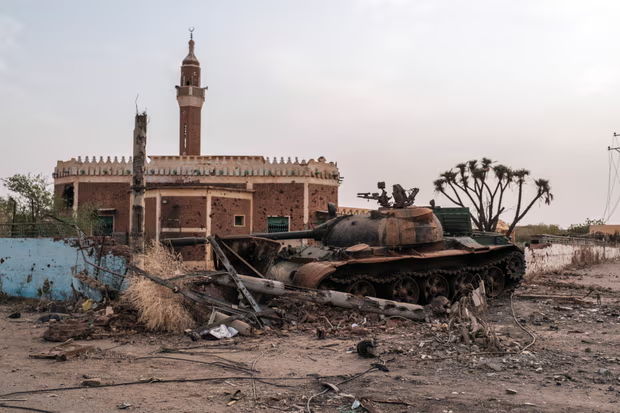The British newspaper The Guardian has revealed compelling evidence of the UAE’s involvement in the Sudanese civil war, following the discovery of Emirati passports among the wreckage of a plane, suggesting the presence of covert forces on the ground.
According to *The Guardian*, these passports, recovered from Sudanese battlefields, point to the UAE deploying secret forces in the ongoing conflict, as indicated by leaked documents.
A 41-page report, which was submitted to the UN Security Council and reviewed by *The Guardian*, includes images of Emirati passports purportedly found in Sudan and linked to soldiers from the Rapid Support Forces, a notorious paramilitary group in the African nation.
The UAE has previously refuted allegations of supplying arms to the Rapid Support Forces, who are engaged in a broader campaign of ethnic cleansing in Darfur and currently laying siege to the city of El Fasher.
The suggestion that the UAE has deployed personnel to support the fighting in Sudan would mark a significant escalation and further complicate the geopolitical landscape of the 15-month-old civil war between the Rapid Support Forces and the Sudanese army.
Authorities have claimed that the passports were recovered from Omdurman, a city across the Nile River from the capital, Khartoum. This area, once controlled by the Rapid Support Forces, was recently retaken by the Sudanese army.
Analysts have termed the discovery “conclusive evidence,” which casts doubt on the UAE’s denials and raises concerns about the extent of Western knowledge and actions regarding the Gulf state’s involvement in Sudan. This revelation prompts questions about whether the US and UK have adequately addressed support for a militia implicated in genocide.
Cameron Hudson, a former US government advisor on Sudanese affairs, said that the West will be obligated to take action. He added: “This will force Washington to admit what it knows about this matter, and will force it to respond.”
Some experts believe that without the UAE’s alleged intervention, the conflict that has led to the world’s worst ongoing humanitarian crisis would have already ended.
The document, sent last month to the United Nations Security Council, indicates that the UAE provided the Rapid Support Forces with modified drones to drop controversial thermobaric bombs. These bombs are more destructive than conventional explosives of similar size, and there have been calls to ban them.
The documents included pictures of the pages of four passports that appeared to belong to citizens of the United Arab Emirates, two of whom were born in Dubai, one from the city of Al Ain, and another from Ajman, the fifth largest city in the United Arab Emirates. The ages of all of them range between 29 and 49 years.
A source familiar with the discovery said that the passports were recovered from the wreckage of a car found in Omdurman in February. The source, who requested anonymity, added, “It is estimated that it belongs to Emirati intelligence officers.”
At the same site, two passports of two Yemeni citizens were found, one of them a 38-year-old, born in Dubai, and the other a 31-year-old from Al Dhalea, southwest Yemen.
The Rapid Support Forces (RSF) had previously dispatched thousands of fighters to Yemen to combat the Houthis, and the recent discovery of Yemeni passports in Sudan suggests a potential reciprocal arrangement.
UN sanctions monitors have deemed the allegations of UAE military support to the RSF as “credible.”
Kholoud Khair, a Sudanese political analyst and founding director of Confluence Consulting, commented that the recovered passports significantly alter the narrative. She stated, “This undermines the UAE’s claims of non-involvement in supporting the Rapid Support Forces militarily.”
Khair further emphasized, “This constitutes conclusive evidence when corroborated by additional information.” She noted that while the UAE denies direct involvement, it is clear that substantial support has been provided to the RSF.
Hudson, a former CIA intelligence analyst for Africa, said this discovery means it will be difficult for the UAE to distance itself from Sudan.
He added: “In general, they worked through agents, and were not directly involved. “They wanted some plausible deniability and they clung to that.”
The document reveals specifics about military equipment recovered from the battlefields of Sudan, Africa’s third-largest country.
Experts have identified a quadcopter drone, equipped with tubes for dropping modified 120 mm mortar bombs, as likely supplied by the UAE.
Additionally, photographs of weaponry boxes show they were dispatched by a Serbian arms company to the “UAE Armed Forces, Joint Logistics Command, Abu Dhabi.”
The boxes suggest the bombs are filled with thermobaric material, designed to create high-temperature explosions, enhancing conventional explosive effects.
Phoenix Insight, a firm specializing in weapon analysis for various organizations, noted that these modified bombs are part of a drone kit, indicating a comprehensive package supplied by a single company. This connection suggests that the UAE Armed Forces might be directly implicated.
Nick Jenzen-Jones, director of the Armament Research Services Foundation, which has previously tracked Emirati weaponry in Libya and Yemen, confirmed that the document suggests 120mm mortar shells provided to Emirati forces were likely “seized” in Sudan.
The document also includes images of surface-to-surface missiles, anti-aircraft guns, and wire-guided anti-tank systems, though experts assert there is sufficient evidence to link these items to the UAE.



